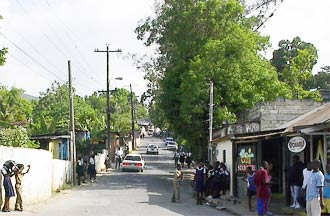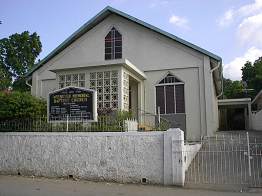
Granville is a highly textured community, a matriarchal society with a vibrant and rich African cultural tradition nestled between two estates in the north coast parish of St James. Peopled by peasant farmers, small traders, artisan and skilled workmen who cohabited in later years with migrant sugarcane workers from the Barracks of Barnett Limited on rented premises; those migrants hailed from Hanover, Westmoreland and St. Elizabeth.
The Granville community is a hot spot according to the police blotter; recently, the community has been the subject of intense media reports precipitated by the increased level of murders and the allegation that Granville is the epicenter of the notorious Montego Bay Lotto Scam.
Rich and Happy
There is a motto advanced by an emerging class within the Granville community, to be rich and happy with the emphasis on rich. Born in the shadows of the Great House, one can easily discern the source of such ambition. The motive force of indignity, disrespect and an outcast state; living on the periphery of the social order. These children of salves have no intention of wasting their years on the sugar estate as their forefathers before them did, nor the low paid jobs on the new plantations, ending their productive years with nothing to show. For them, this generation, it is death before dishonour.
We are extremely proud of those Granvillians who have taken the long and tedious route of education in order to leap over the treacherous barbed wire fence of poverty; we celebrate their achievements, many who are successful professionals, teachers, doctors, attorneys-at-law, bankers, engineers and pilots. Yet, we understand well the motive of those left behind even as we condemn the criminal enterprise that they have methodically weaved to be somebody in a society where you are what you have.
Growing a middle class
Ours is now the task of mobilizing this latent energy to achieve and direct it towards the useful and the good, to marry these highly trained professionals and the creative energies of the new vibrant and determined citizenry. Can we do? Yes we can. This system has produced some of us who are irredeemable and frankly, we may have to, in the process, suspend our sensibilities. We don’t have the means and the patience to rehabilitate; they must face the brutal and lethal force of the state.
We must look from within for the solution to our unfortunate state, we cannot, neither should we expect that our salvation will come from missionaries at home or from abroad. We must grow our own middle class that will engender stability hope and opportunity.
Reaching out to Granvillians in the Diaspora and those professional within and without is a strategic move in seeking to build a partnership to realize the objective of creating a strong and viable middle class. This will make reality of the mantra of “to be rich and happy”.
To meet the demand of a progressive, safe, stable, prosperous and healthy community we will have to advocate dramatic change which must be built on the security of tenure, the promotion of enterprise and continuing education.
There must be some trade off in this process to achieve the objective of building a stable community and the consequent increase of property value. Accordingly, those who are living on rented premises need to be accorded security of tenure through land titling. This will involve preplanning and redeveloping Granville as a mixed use district that will demand streets with adequate setbacks and side walks, open spaces for recreational purposes.
Investment Opportunities
Given its proximity to Montego Bay, land owners, particularly those in the Diaspora, along with local investors can now take advantage of development opportunities in real estate, high density low cost housing solutions, apartment buildings and gated premises are now profitable options for investment.
Most importantly, the preplanning of the community will necessitate the acquisition of land from Barnett Estate for the development of a civic centre for the expansion of Granville and to provide opportunities to the new emerging players for wealth generating activities through commercial and industrial enterprises.
Social Intervention
The palliative approach at social intervention will not seriously impact the unacceptable levels of crime and violence and other antisocial behavior. It is “the economy stupid”; a radical restructuring of the social and economic order which includes altering the obvious inequities that abounds, the growing of a middle class through enterprises, access to finance, land and training for the small business sector, artisans and forward thinking young people from the community are required.

Granville was always a mutinous community that figured prominently in the 1938 labour uprisings with men who ‘led the troop’ against Barnett Sugar Estate; men like Man Binns, Sammy Barrett, Uriah Tomlinson, Hugh Barrett, Edward James. Then there were also the notorious personalities – from Hebbi Angers, Ishmael Goliath, Baba John and Masa Willie. There is no speech nor language where their voice is not heard.
The vision of creating a rich and happy people can be achieved through the unity of all, united in face of the common foe. To quote the celebrated Jamaican poet, Claude McKay: “If we must die, let it not be like hogs hunted and penned in an inglorious spot, while ’round us bark the mad and hungry dogs, making their mock at our accursed lot.”
O. Dave Allen
[email protected]













Hi – As a former Granvilllian, there is much that I might add to how the larger political and economic conditions have undermined, and destroyed, whatever institutions and community values that were being fostered there. But, that’s for another time.
I do want to note one correction. The correct name of the church is Webster Memorial Baptist Church, unless it was renamed in the last three weeks since I last visited.
O. Dave Allen, copious thanks for providing a portal on this rather interesting and historical community in St. James. I found the information regarding Granville extremely edifying and instructive. Hopefully, the residents of Granville will realize, at least some semblance of the rebirth, transformation or renaissance being promulgated by Granvillians such as yourself and other local activists in the medium term. Also, hoping that other communities will look at Granville and learn from Granville experiences in its attempt(s) and struggle(s) to break the intractable forces of marginalization, in its desire to create and develop a viable and functioning middle class, social intervention programs and of course the quest for investment opportunities for residents, institutions and the larger community. Nuff respect !!
The church pictured in this article is indeed the Webster Memorial Baptist Church; not the Burchell [Memorial] Baptist Church near Sam Sharpe Square. My grandmother’s funeral service was held there a few years ago, and ironically, this article echoed the sentiments my mother gave in her reflections about my grandmother’s life. The author’s ‘slip of the fingers’ led me on an intriguing historical journey to the white abolitionist, the Reverends William Knibb and Thomas Burchell, who were acquitted of inciting the Christmas 1831 Slave Uprising, and Deacon Samuel Sharpe, hanged for such.
On the steep ride up to Prospect for my grandma’s interment, I looked over the hillside and saw an incredibly beautiful view of the flowing land, lush forest, and natural bay. Who owns it: The Crown, descendants of plantation owners, or descendants of slaves? My mind’s eye saw a magnificent community better than Iron Shore or Beverly Hills. Having been a part of Granville, I bet many only see “bush and more bush.”
The 19th Century generation fought long to end slavery by making it abundantly clear that we would “rather die on yonder gallows than live as a slave.” Then the 20th Century generation secured plots of land, many through back breaking work in constructing the Panama Canal and as migrant US and Canadian sugar cane farm workers. Unfortunately, the 21st Century “get rich quick” generation was not taught the value of a good education (that will never decay) and the importance of building a foundation through hard work. Also lost is the role of the church in fostering change as it did circa 1831.
Thanks for your keen eyes and correction regarding the name of the church. We will make the correction.